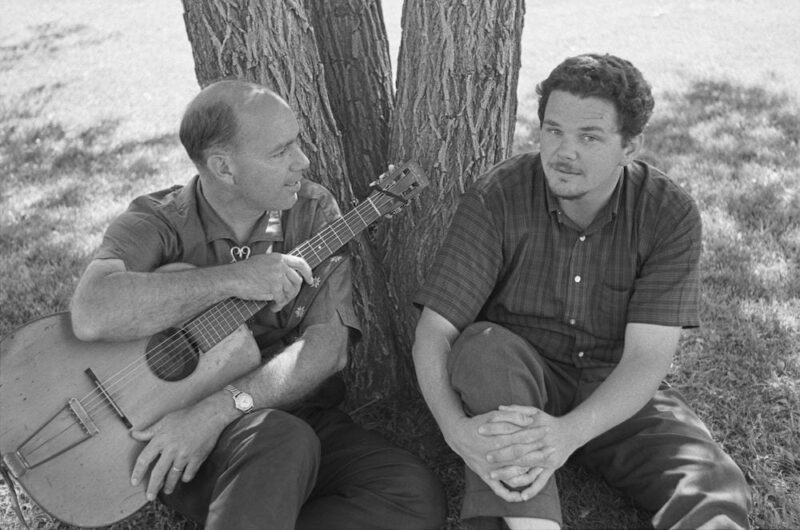Digital public history as folk music hootenanny: Part 2—How we created the Berkeley Folk Music Festival Project
03 February 2022 – Michael J. Kramer
The Berkeley Folk Music Festival Project began with silence. The question became how to activate its noisy past for a broader public when its history only remained in the quiet corners of the archive. The path forward would require not one solitary scholar in the stacks, as with a traditional historical research project, but many participants bringing out the voices, music, and sensory experiences from the repository.
Digital public history projects are necessarily collective endeavors. They need interlocking platforms, encodings, processes, commitments, and institutional investments. They need startup funds and a plan for sustainability. Most of all, digital public history projects need people. Participants must be willing to contribute their expertise and willing to add their voices to an ongoing ensemble arrangement. In this sense, digital public history is a hootenanny, a shared sing-along in which voices interweave to create a chorus. The guitar gets passed around to different leaders, but all are involved in the music making.

Sam Hinton (guitar) and Barry Olivier, 1964. Photo credit: Berkeley Folk Music Festival Archive, Charles Deering McCormick Library of Special Collections, Northwestern University Libraries.
This was in fact the attitude Barry Olivier took with the original Berkeley Folk Music Festival so far as I could tell. He brought people together both in the preparation for the annual event and during the Festival itself. As with the Berkeley event, so too with digital public history. It only works with collective labor. Historians, archivists, coders, librarians, website designers, museum curators, students, and, crucially, community participants collectively transform a preserved collection into an interactive digital experience. In the first years of the Berkeley Folk Music Festival Project, we sought to convene these different experts around overlapping interests. I worked with librarians, archivists, and technologists at Northwestern University Libraries to use the Berkeley Collection as a test case for their digital repository system. Students in my Digitizing Folk Music History seminar developed targeted multimedia research projects to explore what a larger public might be. Many went on to work as research assistants on the project, win student research project awards, and land jobs at companies from Google to Pollstar to the New York Times.
By 2016, Northwestern Libraries were ready to push ahead with a full digitization of the Berkeley Collection. It was an ambitious undertaking. We received a Preservation and Access Grant from the National Endowment for the Humanities and from 2016 to 2021, working with outside digitization vendors, the in-house preservation team at Northwestern, and with me as a consultant, everything in the Berkeley Archive made its way on to Northwestern’s digital repository. Most impressive was the work of the cataloguing team, who created over 1,300 new Name Authority Cooperative Program (NACO) records, as they researched and compiled the metadata for the digital repository. There is still work to do on the metadata, but the Berkeley Folk Music Festival Archive now has robust description for almost all artifacts as well as a digital finding aid.
Some of that description came from participants in the Northern California folk revival, who continue to be crucial experts in helping to shape the project. From Barry Olivier himself, to Festival staff members Dev Singh, Tom Ninkovich, Kelly Hart, and Joe Garrett, to musicians in the Bay Area, they generously shared their memories and named unidentified people in photographs. Folklorist and Berkeley native Neil Rosenberg and his bandmates Scott Hambly and Mayne Smith lent their knowledge of 1950s materials. Alice Stuart, Laurie Lewis, and others provided their memories of attending the festival. In 2012 and 2016 respectively, Alice and Neil even visited Northwestern to talk with my students and present public events on campus.
I have subsequently taught my Digitizing Folk Music History seminar at Middlebury College and SUNY Brockport, where students continue to explore the Berkeley Festival and the folk revival as a whole. Once the archive began to appear online, we could examine the materials at a distance from the collection itself at Northwestern.
In the fall of 2021, with much support from Northwestern librarians, archivists, and technologists, I completed the curation of an introductory digital exhibit, The Berkeley Folk Music Festival & the Folk Revival on the US West Coast—An Introduction. It resides on Northwestern’s WordPress network, available for the public as a multimedia narrative of the Festival’s history and significance. The exhibit seeks to provide multiple entry points for aficionados and newcomers alike: twelve “rooms” use text, images, sound, and video to explore the Festival’s story chronologically. A menu at the top of each page offers a way to navigate the exhibit or a visitor can use a digital timeline created with Timeline.JS to explore the narrative exhibit. An audio playlist provides sound from the Festival. There is a wealth of photographs presented in scrollable digital carousels and even newsreel footage. The exhibit also features three Spotify mixes of commercial recordings by artists who appeared at the event.
The completion of the exhibit marked a major turning point in preserving the archive digitally for researchers and curating it for broader publics beyond scholars alone. Yet there is still much more to do with the Berkeley Folk Music Festival Archive to cultivate digital public history as a hootenanny of collective expression. My final post maps out these upcoming verses of development and iteration.
~Dr. Michael J. Kramer is an assistant professor in the department of history at SUNY Brockport and is the director of the Berkeley Folk Music Festival Project. Email [email protected], Website: bfmf.net, Twitter: @kramermj, @berkfolkmusfest, Instagram: @berkeleyfolkmusicfestival



